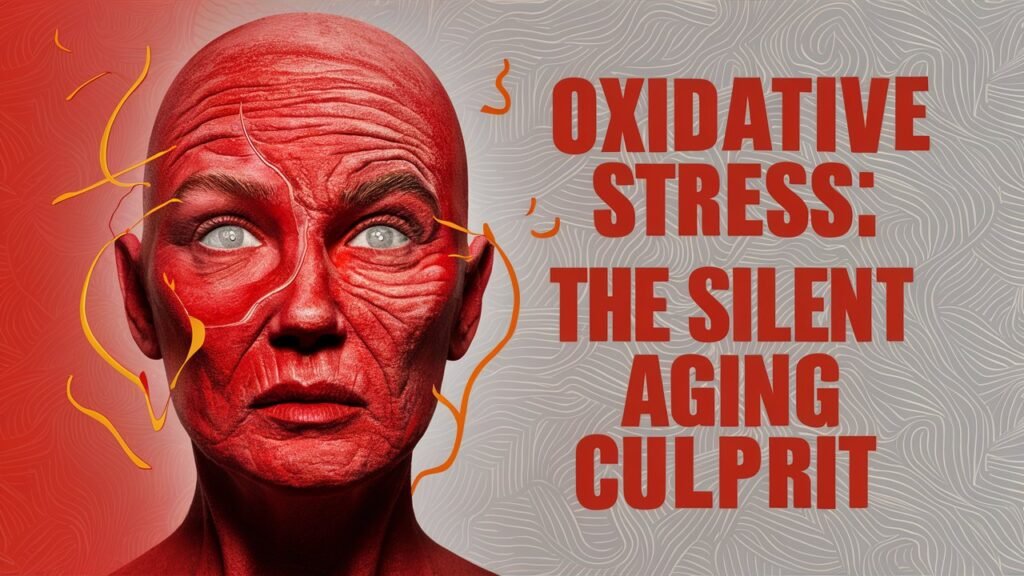Oxidative stress is a leading cause of various chronic diseases as well as aging. It takes place when the already feeble balance between free radicals and antioxidants turns to the side of free radicals, culminating in cellular degradation. This will somehow affect everything from the skin to the organs within. It may usher one into serious health issues like heart disease, cancers, and cognitive decline; however, the good news is there are quite a number of natural means of combating oxidative stress, boosting good health, and slowing aging. In this work, we will look in detail at 10 effective methods to alleviate oxidative stress naturally.
1. Introduction to Oxidative Stress: Understanding the Basics
Oxidative stress is a process that happens in the body when an imbalance exists between free radicals and antioxidants. It has, among others, become increasingly implicated in cancers, cardiovascular diseases, and Alzheimer’s diseases. Antioxidants are molecules that neutralize free radicals, thereby protecting a bodily system against the possibly deleterious effects of free radicals.
It is very significant to grasp oxidative stress induction since it is a process that affects every part of the human body. Reducing oxidative stress could improve overall health, augment energy levels, and help lessen the aging process. Such natural methods could help hunt oxidative stress and improve well-being in the body.
Stay Connected! Subscribe to our newsletter for more articles on improving your health and well-being. Receive tips, recipes, and expert advice directly to your inbox.

2. Why Oxidative Stress is Harmful to Your Health
Oxidative stress is the agent that brings about various medical problems-facial wrinkles to cardiovascular disorders, diabetes, and cancers. Elevated oxidative stress leads to harm to cells, proteins, and DNA, resulting in inflammation and increased risk for chronic degenerative conditions.
It speeds up aging, which is one of the harmful consequences. Free radicals damage the cells that keep the skin young and firm. Wrinkles, fine lines, and lack of elasticity are all visible; this process extends the way toward retarding immune action by oxidative stress, hence rendering a human system more susceptible to infection, thus bringing about degenerative diseases at a later date.

3. The Role of Antioxidants in Combating Oxidative Stress
Antioxidants play an important role in fighting oxidative stress. These substances cuff free radicals to prevent them from damaging cellular integrity. Fruits, vegetables, nuts, and seeds constitute the most visible sources of antioxidants. They can also be consumed in supplement form, should they be required.
Several antioxidants include vitamins C and E, beta-carotene, selenium, and flavonoids. These compounds protect cells against oxidative damage and reduce inflammation and improve heart health while preventing skin aging.

4. 1. Incorporate Antioxidant-Rich Foods into Your Diet
Some of the best natural ways to reduce oxidative stress are eating foods rich in antioxidants. These foods include
- Berries:Blueberries, raspberries, strawberries, etc., are rich in antioxidants, especially vitamin C, which helps repair damaged cells and boosts the immune system.
- Dark Chocolate: Dark chocolate is quite rich in flavonoids and has been shown to counteract oxidative stress and support heart health.
- Leafy Greens: Such as spinach and kale contain antioxidants including vitamin C, beta-carotene, and flavonoids, which work to protect the body from free radical damage.
Eating a mixture of these foods added to food should increase antioxidant intake.

5. 2. Embrace Regular Physical Activity
Regular exercise is one of the best ways to reduce oxidative stress. It promotes the production of antioxidants in the body that fight free radicals and combat their damaging effects. But you should keep in mind that too much exercise without adequate rest can actually increase oxidative stress, hence keep a proper balance.
Moderate exercises include walking and swimming or cycling. These are great for reducing inflammation, enhancing cardiovascular health, and improving overall well-being. Light-intensity exercises, such as yoga and Pilates, can help in reducing stress and enhancing relaxation.

6. 3. Prioritize Sleep for Cellular Repair
Of course, sleep acts as a natural remedy for oxidative stress. It is also during sleep that healing occurs, energy is restored to the body, and antioxidant levels are balanced. Lack of sleep causes excess oxidative stress in the body along with inflammation and chronic diseases.
Most adults need 7-9 hours of sleep every night for optimal health. You can easily fall asleep by developing a regular pre-sleep routine, limiting the time spent on your screens before bed, and ensuring that your bedroom is turned out dark-cool.

7. 4. Manage Stress Effectively with Mindfulness Practices
Chronic stress is a key perpetrator in oxidative stress. During prolonged stress, hormones such as cortisol are released, which tend to raise free radical production. Stress management is an essential step to reduce oxidative damage; good health relies on stress management.
Mindfulness practices, such as meditation, deep breathing exercises, and progressive muscle relaxation, can all assist with stress management. Another alternative is yoga: practice it with a clear mind to reap the dual benefits of stress management as well as improved flexibility and strength.

8. 5. Stay Hydrated for Optimal Detoxification
Hydration reduces oxidative stress and helps ensure the system runs smoothly. Water assists in flushing out toxins from the body and supports the work of antioxidants. Dehydration enhances oxidative stress, which impairs bodily functions and makes one susceptible to the disease.
Drink lots of water throughout the day. Also, include other hydrating foods like cucumbers, watermelon, and celery-they will keep you hydrated and help with detoxing, too.

9. 6. Boost Your Diet with Omega-3 Fatty Acids
Omega-3 fatty acids are essential fats that work to combat inflammation and oxidative stress. Look for omega-3s in salmon, walnuts, flaxseeds, and chia seeds. Omega-3 helps in improving brain health, lowering the risk of heart disease, and protecting the skin against oxidative damage.
In order to incorporate omega-3s into your diet, sprinkle chia seeds on smoothies or eat salmon and walnuts.

10. 7. Add Turmeric and Curcumin to Your Routine
Turmeric, or more importantly, curcumin, its active ingredient, has potent anti-inflammatory and antioxidant properties. Curcumin is known to alleviate oxidative stress, promote cell health, and improve heart health.
Turmeric can go in your dishes, simply sprinkle it upon the vegetables, add it into some soups, or in making tea (also known as golden milk). If you don’t like, there are turmeric supplements available.

11. 8. Include Green Tea for Its Antioxidant Properties
Penna is full of catechins, the powerhouse of antioxidants which has been shown to lessen oxidative stress and enhance overall health. One cup of green tea taken regularly is associated with a reduced risk of developing chronic diseases, better brain function and an improvement in skin health.
Every morning, or during the day, treat yourself to a cup of green tea to enjoy its antioxidant properties. Consider using lemon, ginger, or honey to add twist to its flavor and increase the therapeutic benefits.

12. 9. Get Outside and Enjoy Nature
There is copious evidence that spending time outdoors and in nature somehow lowers your oxidative stress. Being in green spaces reduces cortisol, improves mood, and reduces inflammation. Studies show that being in nature provides a calming effect on the body, which in turn reduces oxidative stress.
Take time to relax in the park, hike in the woods, or just sit outside and breathe in plenty of fresh air.

13. 10. Reduce Exposure to Environmental Toxins
Environmental pollutants include air pollution, cigarette smoke, and chemicals in food and household products that tend to increase the amount of oxidative stress inside the body. Cutting down on exposure to such toxins is paramount to keeping good health.
You can cut back on exposure by choosing organic foods, using natural cleaning products, and avoiding smoking and secondhand smoke. An air purifier can be used in your home to help eliminate airborne toxic pollutants.

Conclusion: The Path to a Healthier, Less-Stressed Life
Adding these 10 natural stress-reducers is one sure way to start making a big difference in good health. Together with food rich in antioxidants, exercise, stress management, and a reduction in environmental toxins, they will boost the immune system, rejuvenate one’s skin, and play a role in slowing the course of aging.
One may wish to try a few of these suggestions, incorporating them into their lives slowly. The journey toward healthier choices combating oxidative stress begins with simple, health-conscious decisions that protect your body from harm.

click here if you want more information about financial wellness, offering expert insights, practical tips, and mindful strategies for managing money effectively.
FAQs: 10 Natural Ways to Reduce Oxidative Stress and Boost Your Health
Q1: What are some common symptoms of oxidative stress?
A1: Oxidative stress can manifest in several ways, including premature aging (wrinkles, fine lines), chronic fatigue, muscle weakness, joint pain, cognitive decline, and skin damage. High oxidative stress can also contribute to more severe conditions such as heart disease, diabetes, and cancer. If you’re noticing early signs of aging or frequent illnesses, it could be related to oxidative stress.
Q2: Can antioxidants really slow down the aging process?
A2: Yes, antioxidants play a crucial role in slowing down the aging process. By neutralizing free radicals, antioxidants help protect cells from damage and reduce inflammation, which are key contributors to aging. Regular intake of antioxidant-rich foods like berries, nuts, and green tea can help protect your skin, reduce wrinkles, and improve skin texture.
Q3: How much sleep should I get to reduce oxidative stress?
A3: To reduce oxidative stress, it’s recommended that adults get 7-9 hours of quality sleep each night. Sleep is the body’s natural recovery period, during which the body repairs itself and restores antioxidant levels. Consistently poor sleep can increase oxidative stress and lead to more severe health issues.
Q4: What are the best exercises to reduce oxidative stress?
A4: Moderate exercises like walking, swimming, or cycling are great for reducing oxidative stress. Yoga and Pilates are also excellent choices, as they not only reduce stress but also promote flexibility and mental clarity. Avoid excessive or intense workouts without adequate recovery, as this can actually increase oxidative stress.
Q5: Is there a specific diet that can help reduce oxidative stress?
A5: Yes! A diet rich in antioxidant-rich foods such as berries, dark chocolate, leafy greens, nuts, and seeds can significantly reduce oxidative stress. Foods high in omega-3 fatty acids (like salmon and walnuts) and turmeric can also help fight oxidative stress. Eating a varied diet filled with natural, whole foods is the best approach to reduce oxidative stress.
Q6: Can environmental factors increase oxidative stress?
A6: Absolutely. Exposure to pollution, cigarette smoke, harmful chemicals, and even excessive sun exposure can significantly increase oxidative stress in the body. To mitigate these effects, it’s essential to avoid toxins, eat a diet rich in antioxidants, and consider using air purifiers in your home.
Q7: How can I improve my mental well-being to fight oxidative stress?
A7: Stress management plays a significant role in reducing oxidative stress. Practicing mindfulness techniques such as meditation, deep breathing, or yoga can lower cortisol levels and reduce the impact of stress on the body. Spending time in nature, engaging in relaxing hobbies, and ensuring emotional well-being can significantly help.
Take the First Step Toward Healthier Living Today! If you’re ready to take control of your health and reduce oxidative stress, start by incorporating antioxidant-rich foods into your diet, prioritizing sleep, and managing stress. Take action today by adding just one of these natural methods to your routine and experience the benefits of improved health.

